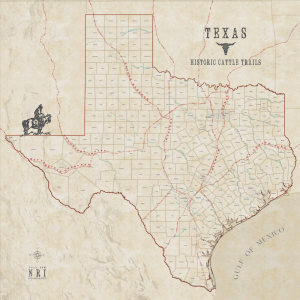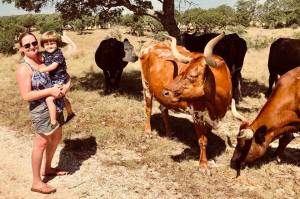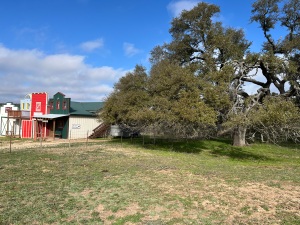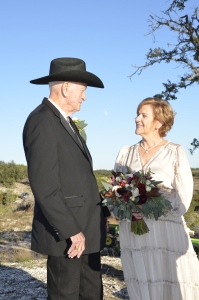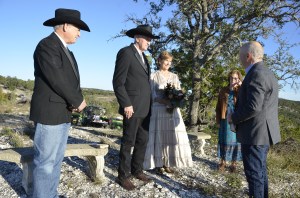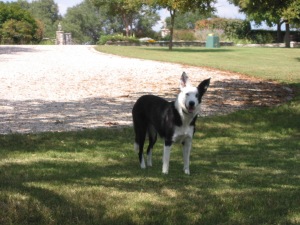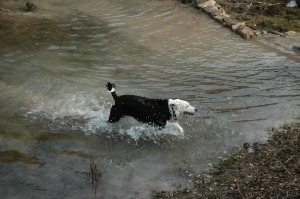While driving across my ranch one early morning several months following retirement, I discovered my neighbor’s exceptionally large White Park bull standing amidst my small, young heifers. This jarring discovery became my first true ranch emergency and called for greater skill than than this neophyte rancher possessed at the time.
My inexperienced Border collies, Bandit and Mollie, surprisingly resolved this frightening situation for me, and by so doing revealed previously well hidden talents. The incident also provided me with a greater understanding of Bandit’s destructive and irritating behavior while feeling restricted in a city.
Bandit represents what can happen to anyone who is poorly suited for a particular place and then becomes transformed when moved to a more conducive environment.
This is a fitting final story about Bandit for this blog series, as he affected our lives so greatly. His story may inspire humans other than ourselves to seek changes in their lives and environments in which they have failed to bloom.
Towering above my black cows stood a giant, ghostly white bull. Its massive white head was accented by black ears, nose, and black-rimmed eyes. The bull was thick, muscular and three times the size of my young, first time heifers.
“Oh damn,” I murmured. “Now what?”
I glanced around for my black Angus bull that I had recently leased to breed my first time heifers, but found it nowhere in sight. I realized that if this white behemoth were to breed my heifers the offspring would be much too large to deliver, putting the lives of my young heifers at risk. I felt a state of near panic rising up within me. The welfare of my young cows depended on me- the clueless city guy who was brand new to cattle ranching.
After shoving two intensely interested Border collies deep within the truck, I opened the door and bailed out of my pickup. If freed I feared my two rookie collies might cause a stampede, leaving either the dogs or the cattle as casualties. I soon spotted a mangled section of fence not far from our old and falling down pole barn. Barbed wire dangled uselessly from broken cedar posts that lay scattered on the ground. The gouged and scraped dirt beneath the broken fence identified where the intruding bull had entered my ranch.

Mollie and Buddy want to help
Bulls are territorial animals. My herd bull would have confronted the the intruding bull at the perimeter fence and would have violently defended his domain. I instinctively knew that my small, leased Angus bull would have had no more chance to repel the larger white bull, than would a destroyer pitted against a battleship.
I picked up a small limb from the ground and scuttled in the direction of the herd as fast as poorly conditioned legs would allow. My hand repeatedly gripped the rough bark of the stick, milking the stick for a plan to expel the intruding bull.
With my attention fixed on the bull, I failed to notice an exposed Live Oak root. I caught my foot on it, lost my balance, lurched forward, and struck the ground hard. My right hip absorbed the initial blow, causing a searing pain to explode down my leg and into my low back. My head next hit, smacking into a cow patty. As I pushed myself up from the ground, the pungent smell of cow dung filled my nostrils. Rage welled up within me. I scraped dung from cheek and glasses, regained my balance, and limped onward; anger supreme over pain. By then I had lost all semblance of common sense.
I shrieked, “I’m getting you, you trespasser! Can’t sneak onto my ranch!”
What I expected to accomplish with my limp along, futile advance was unclear, but lacking a plan to remove the bull, bravado was all I could muster. The bull threatened my small kingdom and challenged my role as protector of these young cows. To be sure, bulls were not the only territorial animals on the Hutton ranch that day.
My herd complete with the offending bull grazed in a pasture nearby the cattle pens. The herd stood a hundred yards removed from my now abandoned pickup, providing a degree of separation from my dogs, but I could still hear their barking coming from within the truck .
When I drew within twenty yards of the bull, the great white bull raised its massive head and slowly turned toward me. Its baleful, unblinking eyes fixed on me; a stare so powerful and so frightening that it stopped my movement. The bull’s coal black eyes seemed to project malevolence. I observed the immense thickness of his neck, thicker than a man’s chest. After taking a deep breath and steeling my resolve, I crabbed forward, all the time visually measuring the distance to the relative safety of the cattle pens in the event that the bull were to charge.
The bull lowered its massive head and slowly scraped his enormous hoof along the ground, throwing dirt up under its massive belly. This aggressive display again momentarily halted my forward progress. I observed how the bull’s dirt-caked nose dripped and how drool streamed from his maw. I could hear the bull’s low-pitched sounds, as if coming from a bass speaker, but so deep it was hard to imagine the sounds emanating from an animal rather than some mythological beast in a subterranean cavern. Evolution designed this warning to frighten away other bulls, predators, and foolish, neophyte ranchers like me.
Mercifully, the bull did not charge, leaving me to share my story. Perhaps surprised at seeing a yelling, flailing, limp along man, carrying but a small stick, he chose instead to fall back. The bull likely did not have fear me as much as viewing me as an inconvenience, like a pestering swarm of flies.
Over the next twenty minutes, I attempted without success to separate the intruding bull from my herd. Despite repeated efforts, the bull stubbornly remained among my heifers. Despite the coolness of the morning, I soon found myself sweating and felt my shirt sticking to my back. My lungs began to burn, and more than once I was forced to bend over with hands on knees to recover from my efforts. My limited physical activity of a physician had certainly not prepared me for such physical exertion.
Once, I briefly separated the bull from the heifers, only to have him circle around me and quickly rejoin the cows. I felt irritated and and even a little embarrassed by my failure. Bulls, I learned, moved surprisingly fast to be such large animals.
Defeated, exhausted, and still smarting from my fall, I limped back toward my pickup. By then the earlier rosy glow above the eastern hills had developed into a breaking dawn. But the additional light provided me no further illumination as to how to rid the bull from the ranch. I turned toward the bull in a parting gesture- in case any neighbors across the fence happened to be watching- and yelled, “Just you wait, you’ll make the biggest meatloaf in history, make the Guinness Book of Records!”
Despite my bluster, I felt diminished and outsmarted by this roving ruminant. My boots scraped along the ground. I felt embarrassed- with my many years of education, outwitted and outrun by a dumb bovine.
While approaching the pickup, I heard howling from within it. When I raised my eyes, I saw my pickup visibly rocking. Bandit and Mollie’s wailing seemed to demand their release. Mollie had by then jumped over the seat and careened from side to side, banging forcibly into the car doors. She used her body like a small battering ram in her attempt to free herself.

Did someone say cows?
Bandit with his well practiced destructive ways had meanwhile shredded the back seat. Stuffing from the macerated seat had spread throughout the cab and the white seat stuffing made the interior resemble a snowstorm. A tuft of stuffing even crowned Bandit’s head like snow atop a mountain peak. Momentarily I stood dumbfounded, looking at the swaying truck and the dog-inspired mayhem within. I learned yet another painful ranch lesson- never leave the Borders in the pickup with nearby cows.
It became ever so clear the dogs demanded their opportunity at moving the bull. But realistically how could small, inexperienced dogs help against this giant marauder? I thought Bandit and Mollie could be hurt or even killed. The risk was too great to consider. I felt anguish, torn by fear for my dogs yet tormented by my responsibility for the young heifers and lack of a viable plan to evict the bull. Good reasons existed for not releasing the dogs, as they could be kicked, stomped, or butted by the giant bull. Their frenzied desire to participate in their Border collie birthright, however, struck me as oddly compelling, and I had no better option.
I grasped the door handle but stood frozen by indecision. The dogs could do no worse than my sloppy misadventure, having driven the intruder still farther from the broken fence line.
Peering through the window of the pickup, I asked, “You want to help?”
In response deeply emotive howls erupted from within. Their tails beat a staccato against the seats, their eyes burned with an intensity not previously seen. Their bodies quivered. I pushed the button on the door handle, cracked the truck door ever so slightly, only to have it blown open, as two yelping Border collies erupted from the pickup like two demons escaping Hades.
“Go get the bull! Get him!” I yelled after them, my voice larded with desperation.
The dogs, like low flying cruise missiles, sped off in the direction of the intruding bull.
They raced across the pasture. Mollie, the younger and faster of the two, reached the bull first. As she neared Mollie cut her stride, dropped her head, eyed the bull, and began slowly to circle him. When an opening arose, Mollie darted between the bull and the cows. She crouched down, awaiting Bandit’s arrival. The bull lowered its head and watched Mollie intently.
Bandit’s appearance was not long in coming and consisted of a headlong, yapping, suicidal charge straight at the bull. His kamikaze-like onslaught caused the giant bovine to spin around to face his new attacker. In the last instant, Bandit veered off, barely escaping the bull’s head butt. This diversion of the bull’s attention provided Mollie the opportunity to surge forth and bite at the bull’s hind legs.
The bull appeared surprised and then perturbed by the double onslaught. He twisted his massive body around to determine the source of the bite and momentarily focused his malice on Mollie. He clattered a huge, hoof over the rocky soil. He bellowed a deeply pitched warning. The bull then retaliated with several ferocious kicks that narrowly missed my circling dogs. My spirits sank. Had I been foolish to release my dogs? A dog’s skull would be crushed by landing a single kick from this massive bovine.
To my surprise, my usually docile pets had transformed into snarling, vicious animals. They fixed wolf-like stares on the bull. They snarled, revealing gleaming white canines. My fear for my dogs’ safety became mixed with incredulity at their agility and bravery. Mollie and Bandit repeatedly darted at the bull, dodging his flying hooves. The efforts of the giant bull kicked up a dust cloud that at times obscured my view of the dogs. I felt loathing for this bull. He threatened the well-being of my heifers but now sought to kill my rookie herders. My heart pounded in my chest.
The bull shifted his glare between Bandit and Mollie, his eyes never leaving my determined dogs. Then the bull lifted his head and, surprisingly, took a tentative step backward. The dogs, sensing his hesitancy, stepped up their attacks as if choreographed, demonstrating a fury that left the bull appearing bewildered. While the dogs appeared to be dodging and diving haphazardly, it became apparent their efforts were forcing the bull to retreat.
By then I had arrived close enough to the mêlée to smell the musky aroma of the bull. I stationed myself on the opposite side of the bull from the downed fence. I brandished my stick- a stick that in the presence of the dogs drew increased respect. Together the dogs and I edged the bull slowly across the pasture toward the distant breech.
After several more minutes, we managed to move the bull about a hundred yards away from the herd. It was when circling from opposite directions that the unexpected happened. The dogs with eyes fixed on the bull collided full force after running into each other. This sent both dogs sprawling in the dirt. For an instant, both Borders lay almost motionless on the ground, legs splayed awkwardly.
On seeing this unexpected opportunity, the bull whirled around and reversed his course and headed back toward the heifers. He swept by me, ignoring my windmilling arms, leaving me standing helpless in his lumbering wake. He had thundered by me so close that I smelled his rank odor and could have reached out and touched his broad back. The dogs quickly reacted, regaining their feet. Bandit stretched a painful limb, as if testing it. Soon both dogs were again afoot and raced back into the fight.
Mollie closed to a spot directly behind the bull where she bit and grasped his tail. In the next instant, I saw Mollie, attached Bulldog-style, rocketing behind the galloping bull looking like a miniature black and white caboose attached to a runaway locomotive. When the bull slowed, Bandit charged and sensing an opportunity, bit down on his broad nose, leaving behind a bloody gash. Bandit’s attack temporarily distracted the bull from the tenacious tail-grasping Mollie.
The bull, now bleeding from his nose, appeared flummoxed. He stepped away from Bandit and then proceeded to buck like a rodeo bull. By so doing the bull’s tail whip-like flung Mollie high into the air. She fell to the ground some twenty feet away, her back awkwardly pressed against a water trough.
My heart sank. Was she hurt? Would she be all right?
As if to answer, Mollie sprang up, shook herself, and raced back across the dusty paddock toward the bull. The collies outran the bull and placed themselves between the bull and herd. At the dogs’ urging the bull again turned back and with collies in close pursuit moved toward the broken fence. He eventually began to run directly for the broken fence line. The dogs, arcing from side to side trailed the trundling, ghost-like bull, herding him always onward.

Where did the bull go?
The bull thundered by the pickup, circled around the corrugated aluminum barn, and crossed the caliche ranch road with his giant hooves causing crunching sounds. The bull then in full gallop with an occasional desultory kick at the pursuing dogs headed for the broken fence and to safety from the pursuing dogs. Despite my best efforts, I fell behind the faster moving bull and dogs. But I was able to view the bull as he jumped through the yawning breach and into the pasture of the neighboring ranch.
I arrived at the breach in the fence where I found Bandit and Mollie pacing like two guard sentries. Both gazed in the direction of the disappearing marauder. I collapsed to my knees, sucking in huge quantities of air. I threw my arms around their furry necks, hugged them fiercely, and buried my face in their pungent, silky coats. Bandit and Mollie had accomplished what only minutes before had seemed utterly impossible.

Bandit, happy at last at the ranch where he never again chewed up furniture
From deep within these collies had come an instinct to separate the foreign bull from the herd and to drive him to the broken fence line. Moments before the dogs had acted ferociously, but they had transformed again into my pets. Their eyes still shone and tongues dangled haphazardly. Bandit and Mollie seemed to comprehend the magnitude of their accomplishment and appeared alive in a way I had never before witnessed.
Still too winded to speak, I embraced my incredible dogs. I scratched their ears. I hugged their necks I feet the softness of their fur against my cheeks. Raspy tongues licked my face and ears. Pride swelled within me. I felt exultant, as my burden had suddenly and miraculously been lifted. Bandit and Mollie, my two courageous Border collies, had provided a present, as dear in their giving as in my receiving.
Eventually my breathing became more normal and I was able to speak. I cupped their warm, damp muzzles in my hands. The dogs stared back at me, their eyes gleaming. They appeared expectant. With my first words, I uttered the time honored, but ever so parsimonious Border collie congratulation.
”That’ll do Bandit.”
“That’ll do Mollie.”
If you have not had the chance to read my latest book, Hitler’s Maladies and Their Impact on World War II: A Behavioral Neurologist’s View (Texas Tech University Press), I invite you to do so. The book explores an important aspect of the Hitler story and World War II that has not been well studied. Many of Hitler’s catastrophic errors including the premature invasion of the Soviet Union in June 1941, the slowness of German forces to counterattack at the Battle of Normandy in 1944, and the highly risky Battle of the Bulge in late 1944 into 1945, can be better understood, knowing the sizeable impact that Hitler’s physical and mental conditions had on these vital battles.
Also, consider picking up a copy of my earlier book, Carrying The Black Bag: A Neurologist’s Bedside Tales (Texas Tech University Press). Please join me on my personal journey as a physician and meet my patients whose reservoirs of courage, perseverance, and struggles to achieve balance for their disrupted lives provide the foundation for this book. But step closely, as often they speak with low and muffled voices, but voices that nonetheless ring loudly with humanity, love, and most of all, courage.





